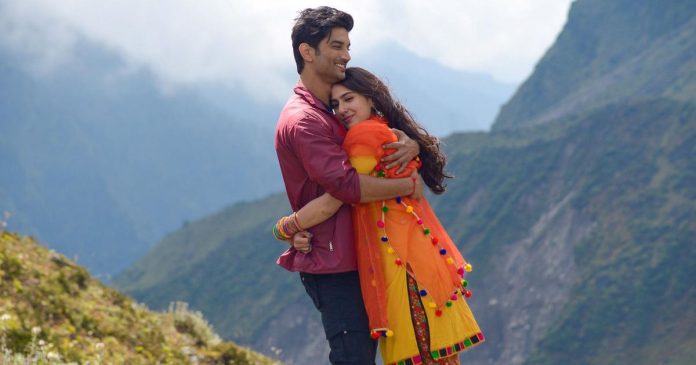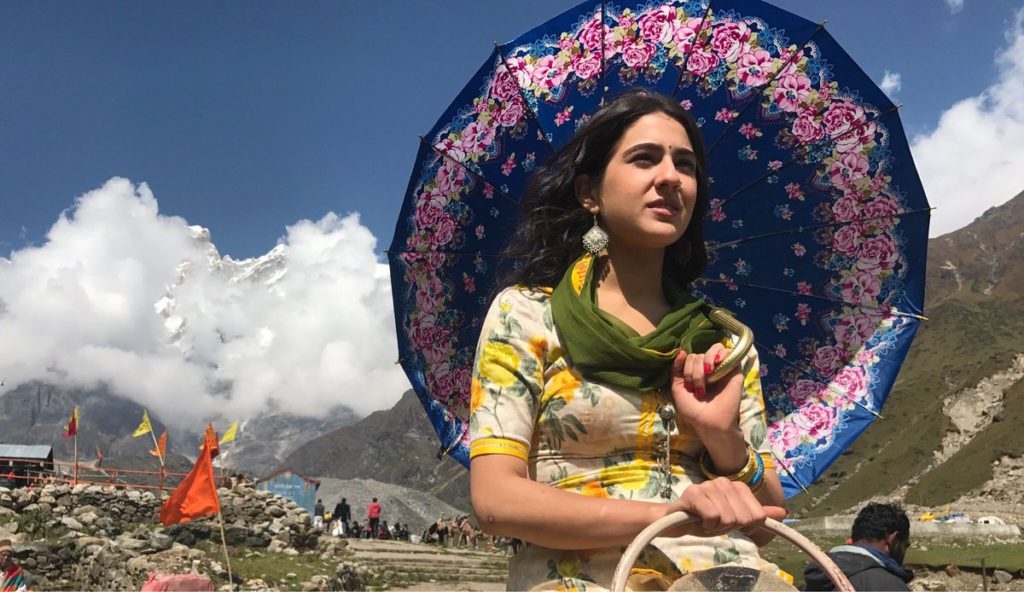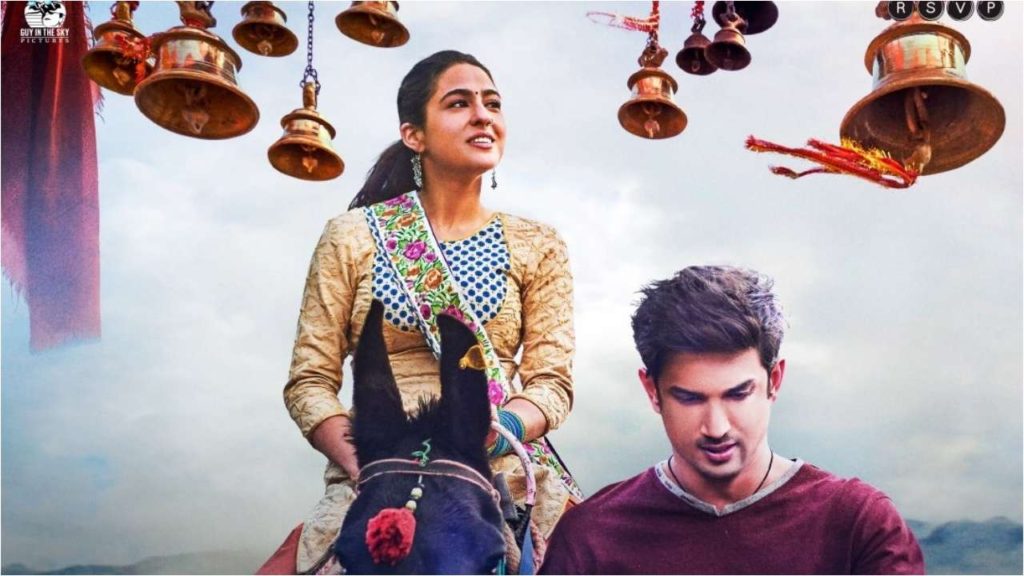
Abhishek Kapoor’s Kedarnath begins with a circular shot. Staged at what looks like the entrance to the famous pilgrim town by the same name, the shot pans across a water body, a building structure and then to a traveller who is reluctant to take the journey uphill. The angles change in a jiffy and the leading man Mansoor (Sushant Singh Rajput) is introduced. He is a porter and also a practising Muslim with his do-gooder halo refusing to vanish. There is a generic exchange of communal banter which is no surprise coming from a film that (for no particular reason) intends to spread the message of unity. Yet, what intrigued or rather worried me is the style of cinematography (Tushar Kanti Ray). I wondered if it was going to be a dizziness-inducing spectacle where everything was to be shot from a high angle, with the picture postcard-like location captured and coloured to perfection. Well, that is not the case. However, the camera simply refuses to be still. It is forever in some kind of motion (or at least it is made to appear so). The lovers want to fall in love but the camera’s obsession for movement does not let them even look into each other’s eyes. More to it later.

Talking about the premise of Kedarnath, here is a film that badly wants to be a Romeo and Juliet. Or at least a Laila Majnu with the protagonists having greater callings to attend. Now, what do you call a love story that treats ‘love’ as a stepchild? The story in here is that of Mansoor and Mandakini aka Mukku (Sara Ali Khan) who belong to different religions (she is Hindu). The conflicts are set by default and it is as if the writers (Kanika Dhillon and Abhishek Kapoor) want the leads to fall in love – more than the characters themselves. I mean, keep aside the odd and clichéd meet cute where the couple watches an India-Pakistan cricket match on television, there is barely a reason why they would show familiarity to each other. I can’t stop not pinpointing the absolutely uninspiring way that the writers sketch Mandakini’s character. It is several notches down from Dhillon’s own female character in Manmarziyaan, which in itself was far from being a well-fleshed out one. Mukku is that girl who is a firebrand at home, loves cricket, talks rudely to elders, resists forced relationships and is generally loud – basically, all things Bollywood with a definite air of déjà vu. It is just that character design gets irksome and uncreative when she does things like, say, pricking Mansoor’s hands when something unfavourable happens in the match. You know, Kedarnath belongs to that stratosphere of Bollywood romances. Also, the plot bears an uncanny resemblance to – wait for it – Titanic but only with less charming protagonists living in a more exotic landscape.
Well, if you ask me, the film does not use its environment to good advantage either. Come to think of it, you have two conventionally good-looking people and a picturesque backdrop. What more do you need to let a love story bloom, in a ridiculously commercial sense? Not even a tumultuous story, I say. Perhaps a couple of scenes where they could intercut the couple looking into each other’s eyes, followed by a tranquil shot or two (or three) of the valleys, mountains and the likes with the soothing sound of flowing streams in the background – I can sense romance everywhere. You don’t need to tell me who Mansoor and Mukku are, what religions they follow, their social status or add absurd song situations that are way out of context. Instead, Kedarnath wastes pages (much like this review) to come to a point that was already established – lovers belonging to different religions cannot legitimate their relationship. So, let us cut some slack and believe that this some sort of a bizarre cinematic liberty that the film wants to employ. Still, what happens next is even more baffling. Mansoor is either under-expressing or over-expressing his feelings for everything around – be it love, religion, regional identity and so on. Mukku eventually turns into a morose being who looks at her lover being thrashed into pulp and blurts out annoying things on the lines of, “If he can’t survive this then how will he endure what lies ahead?” I do understand the intoxication that love brings in but, wait, I didn’t see any fire brewing between the two at any point. What did I miss?
Kedarnath is not the Before Trilogy. You cannot parade up and down a hill, talking about irrelevant things and expect sparks to fly – which is precisely what director Kapoor wants to sell. If I remember, all I took note of was Mukku’s way of eating Maggi Noodles and that she was impeccably dressed throughout in colourful clothes and ornate umbrellas. She is supposedly travelling to her dukaan (a local boutique) but we see none. (Wait, was it a metaphor that nobody could decipher?). Mukku is also a sheltered (and shamelessly commoditized) 19-year old but her parents do not seem to care much post their introduction scene. Mukku is no Veera from Highway either despite a peculiar situation at home. Kedarnath is at best a strange experiment on how not to milk the talent of its luminous female lead (Khan). Instead of mirroring her winsome presence, the film chooses to expose her rawness and weaknesses to the T. I agree that she has been photographed exceedingly well with all the right shadows and soft lights but what to make out of a film that believes it is India’s answer to The Shape of Water?
Kedarnath ends, predictably, with a natural calamity. While it is an overwhelming visual experience with some half-decent VFX, none of it saves the film from drowning into a mud pool of pointlessness, much like its listless supporting cast and bit players during the floods. The leading man Mansoor’s character arc reminded me of Moideen from RS Vimal’s Malayalam romantic drama, Ennu Ninte Moideen which emerged from a similar emotional space. Though not fully satisfying, that film could – at least – convince us that its estranged lovers were passionately in love. As for Kedarnath, before we could begin to take Mansoor and Mukku seriously, all the logic gets washed away and this is cannot be blamed upon the penultimate (and literal) watershed moment.
Rating: ★★


